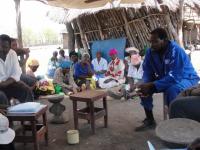GEF-SCCF Project Increases Resilience to Drought and Climate Change in Zimbabwe


In Chiredzi over 45% of the population has been classified as poor or very poor and 60% of households face food security challenges. The GEF has invested in improving food security by promoting use of more than one or two crops, reducing reliance on rain-fed agriculture and improving water use, introducing drought-resistant crops and building on benefit sharing institutions. Lessons learned to date include the need to: develop institutional capacities and policy frameworks at national and local levels; use bottom-up and participatory processes in project design; promote a “learning by doing” approach to using climate forecasting tools; and use farmer-managed demonstration activities. The project has identified limitations in the ability for local knowledge related to climate forecasting to provide reliable forecasts, and has documented an interest from farmers on sharing climate risk information.
December 2011: In Zimbabwe’s rural District of Chiredzi, the Special Climate Change Fund (SCCF) of the Global Environment facility (GEF) has supported a project to enhance the capacity of farmers to adapt to climate variability and change through the adoption of gender-sensitive approaches.
The project, which is implemented by the UN Development Programme (UNDP), focuses on improving climate change knowledge base of local populations to facilitate adaptation choices; piloting demonstration of policy oriented adaptation practices; and promoting the use of climate early warning systems.
(0) Comments
There is no content